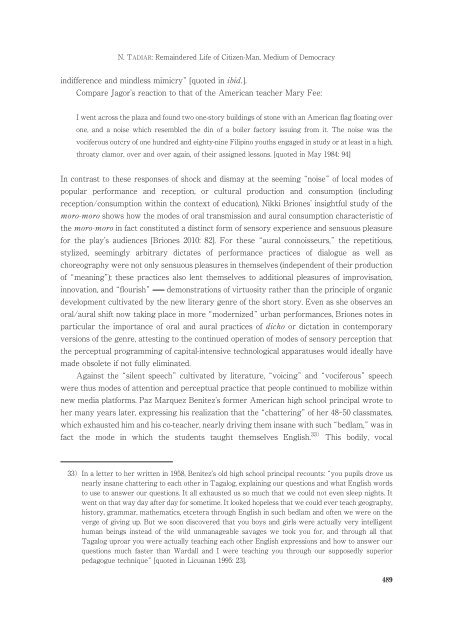Remaindered Life of Citizen-Man, Medium of Democracy
Remaindered Life of Citizen-Man, Medium of Democracy
Remaindered Life of Citizen-Man, Medium of Democracy
You also want an ePaper? Increase the reach of your titles
YUMPU automatically turns print PDFs into web optimized ePapers that Google loves.
N. TADIAR: <strong>Remaindered</strong> <strong>Life</strong> <strong>of</strong> <strong>Citizen</strong>-<strong>Man</strong>, <strong>Medium</strong> <strong>of</strong> <strong>Democracy</strong><br />
indifference and mindless mimicry” [quoted in ibid.].<br />
Compare Jagorʼs reaction to that <strong>of</strong> the American teacher Mary Fee:<br />
I went across the plaza and found two one-story buildings <strong>of</strong> stone with an American flag floating over<br />
one, and a noise which resembled the din <strong>of</strong> a boiler factory issuing from it. The noise was the<br />
vociferous outcry <strong>of</strong> one hundred and eighty-nine Filipino youths engaged in study or at least in a high,<br />
throaty clamor, over and over again, <strong>of</strong> their assigned lessons. [quoted in May 1984: 94]<br />
In contrast to these responses <strong>of</strong> shock and dismay at the seeming “noise” <strong>of</strong> local modes <strong>of</strong><br />
popular performance and reception, or cultural production and consumption (including<br />
reception/consumption within the context <strong>of</strong> education), Nikki Brionesʼ insightful study <strong>of</strong> the<br />
moro-moro shows how the modes <strong>of</strong> oral transmission and aural consumption characteristic <strong>of</strong><br />
the moro-moro in fact constituted a distinct form <strong>of</strong> sensory experience and sensuous pleasure<br />
for the playʼs audiences [Briones 2010: 82]. For these “aural connoisseurs,” the repetitious,<br />
stylized, seemingly arbitrary dictates <strong>of</strong> performance practices <strong>of</strong> dialogue as well as<br />
choreography were not only sensuous pleasures in themselves (independent <strong>of</strong> their production<br />
<strong>of</strong> “meaning”); these practices also lent themselves to additional pleasures <strong>of</strong> improvisation,<br />
innovation, and “flourish” demonstrations <strong>of</strong> virtuosity rather than the principle <strong>of</strong> organic<br />
development cultivated by the new literary genre <strong>of</strong> the short story. Even as she observes an<br />
oral/aural shift now taking place in more “modernized” urban performances, Briones notes in<br />
particular the importance <strong>of</strong> oral and aural practices <strong>of</strong> dicho or dictation in contemporary<br />
versions <strong>of</strong> the genre, attesting to the continued operation <strong>of</strong> modes <strong>of</strong> sensory perception that<br />
the perceptual programming <strong>of</strong> capital-intensive technological apparatuses would ideally have<br />
made obsolete if not fully eliminated.<br />
Against the “silent speech” cultivated by literature, “voicing” and “vociferous” speech<br />
were thus modes <strong>of</strong> attention and perceptual practice that people continued to mobilize within<br />
new media platforms. Paz Marquez Benitezʼs former American high school principal wrote to<br />
her many years later, expressing his realization that the “chattering” <strong>of</strong> her 48-50 classmates,<br />
which exhausted him and his co-teacher, nearly driving them insane with such “bedlam,” was in<br />
fact the mode in which the students taught themselves English. 33) This bodily, vocal<br />
33) In a letter to her written in 1958, Benitezʼs old high school principal recounts: “you pupils drove us<br />
nearly insane chattering to each other in Tagalog, explaining our questions and what English words<br />
to use to answer our questions. It all exhausted us so much that we could not even sleep nights. It<br />
went on that way day after day for sometime. It looked hopeless that we could ever teach geography,<br />
history, grammar, mathematics, etcetera through English in such bedlam and <strong>of</strong>ten we were on the<br />
verge <strong>of</strong> giving up. But we soon discovered that you boys and girls were actually very intelligent<br />
human beings instead <strong>of</strong> the wild unmanageable savages we took you for, and through all that<br />
Tagalog uproar you were actually teaching each other English expressions and how to answer our<br />
questions much faster than Wardall and I were teaching you through our supposedly superior<br />
pedagogue technique” [quoted in Licuanan 1995: 23].<br />
489
















